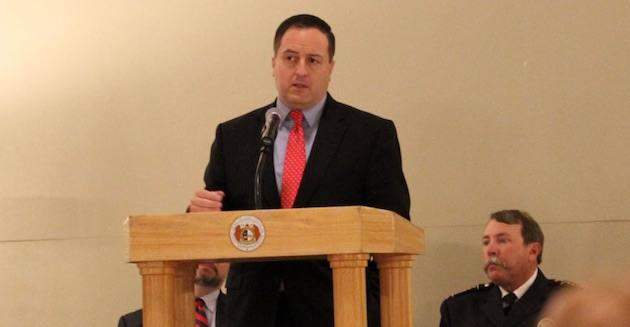State recognizes crime victims and efforts to help them

With little fanfare, Missouri’s crime victims were the focus of special recognition as the state observed National Crime Victims’ Rights Week. State lawmakers and victim rights organizations brought attention to programs and services supporting victims and the state’s continuing efforts to reduce crime.
During a ceremony Friday at the Missouri State Capitol Rotunda, state officials honored crime victims, survivors and efforts of victim advocates.
This year’s theme — “Expand the Circle, Reach All Victims” — recognized the importance of reaching out to all victims to ensure they have access to resources and support.
“The best way to fight crime is to prevent it with the assistance of our law enforcement partners, community groups and organizations that support victims of human trafficking, domestic violence and all crimes,” Department of Public Safety Director Drew Juden said. “Our department is much more than a law enforcement agency. We support crime victims through grants supporting domestic violence shelters, counseling services, and victim advocates. We also provide millions of dollars a year in direct support to crime victims to reimburse them for medical expenses, counseling and lost wages through the Crime Victims’ Compensation Program.”
On March 1, Gov. Eric Greitens signed House Bill 1246 into law, which aims to combat human trafficking by requiring certain businesses to display posters with information about a national human trafficking hotline and raising awareness of a crime that has been referred to as modern-day slavery.
The first piece of legislation to become law during this legislative session requires airports, passenger train stations, truck stops, bus stations, urgent care centers and certain other businesses to display the anti-human trafficking posters by March 1, 2019. The Department of Public Safety is developing a poster and a website where it will be possible to download it for printing.
“Courage, strength and endurance are the words that can be used to describe many victims of crime,” Missouri Association of Prosecuting Attorneys President Amy Fite said. “When we hear about a crime, frequently the fact that there is an individual and/or an individual’s family that is affected somehow gets lost when the crimes are being reported.
Victim, survivor and advocate Sharon Liebman, of St. Louis, told the crowd how she overcame domestic violence. Speaking through an interpreter, Liebman — who is deaf — said it was heartbreaking her children were part of the cycle of suffering of domestic violence at the hands of her ex-husband. She talked about how initially she was let down by the court process, but thanks to help and support from her advocates she was able to overcome her obstacles.
“They told me we would get through this journey together,” Liebman said. “They gave me hope, and I knew I had access to resources. They showed me how to help myself. I found I had the right to pursue my own happiness. I had the freedom to live, the right to feel safe again — but most important, the right to love myself again. You could say I was like the cowardly lion in ‘The Wizard of Oz’ and I was able to find my courage.”
The Department of Public Safety administers grant funding for several programs and projects to victim-centered agencies, including the Crime Victims’ Compensation Program and the Missouri Victim Automated Notification System.
The program allows Missouri crime victims to receive automated emails or phone calls any time an offender is scheduled to be released from prison or jail or have a parole or court hearing. It also allows anyone to receive an automatic notification anytime an order of protection has been served in their case. In the last five years, MOVANS has delivered almost 5 million automated phone calls, emails and letters about court dates and offender custody status.






